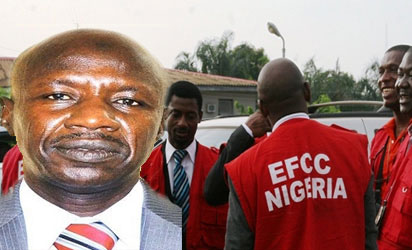
Four oil subsidy swindlers have been found guilty as charged, by a Federal High Court in Lagos presided over by Lateefat Okunnu. Two of them bagged 10 years’ imprisonment each. The first, Ada Ugo-Ngali and her company’s boss were convicted in January, while Rowaye Jubril followed in March. Besides being gaoled, they are to refund to the Federal Government, N755 million and N963 million respectively, being the amounts obtained through false claims that they imported Premium Motor Spirit into the country in 2011.
With justice served in these cases prosecuted by the Economic and Financial Crimes Commission, Okunnu has demonstrated that scammers can be brought to book, despite an avalanche of skullduggery employed to subvert legal processes. Obviously, the trials were not state priority throughout the Goodluck Jonathan tenure when the offences were perpetrated.
Ugo-Ngali, who was the Managing Director of Ontario Oil and Gas Limited, was convicted along with the chairman of her company, Walter Wagbatsoma, and the company itself in a trial that began in August 2013. Jubril was first arraigned in November 2012. The convicts were among the racketeers implicated in the 2011 subsidy bazaar involving N2.53 trillion. A House of Representatives ad hoc committee had investigated the fraud in the Petroleum Support Fund Scheme, limiting its focus to between 2009 and 2011, in the wake of the 2012 national protests against petrol subsidy removal. Scores of protesters were killed by armed agents of the state, as a result.
According to the EFCC, 17 oil marketers were on trial as of 2014; but the addition of corporate suspects (companies) brought the total number of cases to over 40. The convictions at Okunnu’s court should inspire the EFCC to strengthen its prosecutorial capacity so that more could be secured. The public as well should be concerned about similar cases in other courts.
It is deprecatory that the country’s opaque justice delivery system has aided the scoundrels, many of whom owned up to the brazen theft during the Reps investigation, to delay the trials through their counsel and some warped members of the bench. This is why the Administration of Criminal Justice Act 2015, enacted to forestall such circumstances has so far been ineffectual. Redressing this, is a challenge the new Chief Justice of Nigeria, Walter Onnoghen, has to face squarely.
Before now, Federal Government’s indifference in the recovery of the looted funds, or subjecting the suspects to the due process of the law, came to light with its cold reaction to the legislature’s findings. The Presidency was not jolted by the refusal of some of the marketers to appear before the Reps committee to defend themselves. Nor did it swing into action against them when they also spurned the invitation of the Presidential Committee headed by Aigboje Aig-Imoukhuede that reviewed the Ministry of Finance technical report on the scam. Nine of such companies failed to appear.
This was understandable though. Apparently, the dodgy transactions were backed by a high level of official complicity. For instance, the House Committee had discovered that a particular Accountant-General of the Federation made payments of equal installments of N999 million for 128 times within 24 hours, amounting to N127.8 billion, to some subsidy beneficiaries, and failed to disclose their identities on demand. A total of 140 companies purportedly imported petrol in the 2011 dubious claims.
However, it was public agitation that induced the government to eat humble pie by delisting 98 of the companies from the number of approved fuel importers. This is instructive. Similarly, the government reduced subsidy payment drastically from N2.5 trillion to N971 billion in 2012. Given the actual budget expenditures on subsidy for petrol and kerosene, during the immediate preceding years, which were as follows: N261.1 billion (2006); N278.8 billion (2007) and N346.7 billion in 2008, according to the Reps panel, it does not require any forensic skill to establish that something thoroughly fraudulent was involved in the 2011 claims.
The Aig-Imoukhuede report had recommended that N382 billion be recovered from 21 firms, whereas the Reps report affirmed that N1.7 trillion could not be accounted for. Whatever is the true figure, it is troubling that only N5 billion had been recovered as of August 2014, according to the EFCC.
Given the role the Petroleum Products Pricing Regulatory Agency, the NNPC and the OAGF played in this treasury raid, it is apposite that the Muhammadu Buhari administration should dig deeper than the earlier probe. The recent government recovery of $202 million from Aiteo, for under-delivered crude oil swaps, which occurred about the same period as the subsidy scam, underscores the point.
It is beyond belief that N127.8 billion was paid to some beneficiaries and the OAGF did not disclose their identities; worse still, no government has quizzed such a public officer, even if he might have left office. As the Reps report said, “It was inconceivable that all (the marketers) would have imported the same quantity of products to warrant equal payments (N999 million).” No matter how long it takes, all the crooks involved in this bazaar should be made to face the consequences.
END

Be the first to comment